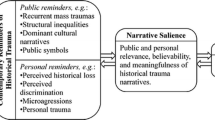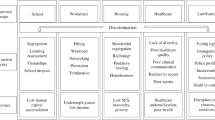Abstract
Race proved not merely a disadvantage in securing access to prompt and appropriate medical care, but often became a life and death issue for blacks in the American South during the early decades of the twentieth century. This article investigates the impact some of the new academic disciplines such as anthropology, evolutionary biology, racially based pathology and genetics had in promoting scientific racism. The disproportionately high morbidity and mortality rates among blacks were seen as a consequence of inherent racial deficiencies that rendered any attempt to ameliorate their situation as futile. While the belief in a different pathology in blacks initially deterred most health officials from taking any action, advances in medicine and microbiology, in particular the germ theory, stirred a variety of responses out of sheer self preservation, as fears among whites at the first sign of an epidemic initiated sporadic and limited actions. Ironically, in an era of deepening scientific racism, public health initiatives based on a better understanding of disease causing microorganisms, gradually improved black health. However, some public health measures were hijacked by eugenicists and racists and, rather than addressing the ill health of blacks, public health policy complied with the new laws of heredity by promoting drastic measures such as involuntary sterilization or even abortion. This further complicated the strained relationship between southern blacks and health care professionals and effected ongoing distrust towards public healthcare services.
Similar content being viewed by others
References
Baker, Lee D. 1998. From Savage to Negro: Anthropology and the Construction of Race, 1896–1954. Berkeley: University of California Press
Baptiste-Roberts Kesha, Gary Tiffany L., Beckles Gloria L. A., Gregg Edward W. et al. 2007. Family History of Diabetes, Awareness of Risk Factors, and Health Behaviors among African Americans. American Journal of Public Health 97, 5: 907–913
Barkan Elazar. 1992. The Retreat of Scientific Racism: Changing Concepts of Race in Britain and the United States between the World Wars. Cambridge: Harvard University Press
Beardsley Edward H. 1987. A History of Neglect: Health Care for Blacks and Mill Workers in the Twentieth-Century South. Knoxville: Tennessee University Press
Bogart, Laura, Thorburn Sheryl. 2005. Are HIV/AIDS Conspiracy Beliefs a Barrier to HIV Prevention Among African Americans? Journal of Acquired Immune Deficiency Syndromes 38, 2: 213–218
Bureau of the Census. 1943. Vital Statistics Rates in the United States, 1900–1940. USA: Government Printing Office
Chase, Thomas N. (ed.). 1903. Mortality Among Negroes in Cities (Second Edition). Atlanta University Publications 1
Chesler Ellen. 1992. Woman of Valor: Margaret Sanger and the Birth Control Movement in America. New York: Simon & Schuster
Coates Ta-Nehisi Paul, Song Sora. 2005. Suspicious Minds Time 166, 1: 36
Cravens, Hamilton. 1978. The Triumph of Evolution: American Scientists and the Heredity-Environment Controversy 1900–1941. Philadelphia: Pennsylvania University Press
Crisis, The. Du Bois, W. E. B. (ed.). 1910–1934. Baltimore: Official Organ of the National Association for the Advancement of Colored People
David Richard, Collins James Jr. 2007. Disparities in Infant Mortality: What’s Genetics Got to Do with It? American Journal of Public Health 97, 7: 1191–1197
Davidson Andrew R. 1997. Topics for Our Times: Norplant Coercion. American Journal of Public Health 87, 4: 550–551
Davis, Angela Y. 1981. Women, Race and Class. New York: Random House
Degener Theresia. 1990. Female Self-Determination between Feminist Claims and ‹Voluntary’ Eugenics, between ‹Rights’ and Ethics. Issues in Reproductive and Genetic Engineering 3, 2: 88
Du Bois, W. E. Burghardt (ed.). 1906. Health and Physique of the Negro American. Atlanta University Publications 11
Du Bois W. E. Burghardt. 1932. Black Folk and Birth Control. Birth Control Review 16: 166–167
DuBois Ellen Carol, Ruiz Vicki L. (eds.). 1990. Unequal Sisters: A Multicultural Reader in U.S. Women’s History. New York: Routledge
Egede Leonard E., Bonadonna Ramita J. 2003. Diabetes Self-management in African Americans: An Exploration of the Role of Fatalism. The Diabetes Educator 29: 105–115
English Daylanne. 2000. W.E.B. DuBois’s Family Crisis. American Literature 72, 2: 291–319
English, Daylanne. 2004. Unnatural Selections: Eugenics In American Modernism and the Harlem Renaissance. Chapel Hill: North Carolina University Press
Ettling, John. 1981. The Germ of Laziness: Rockefeller Philanthropy and Public Health in the New South. Cambridge: Harvard University Press
Ferris Louanne. 1969. I’m Done Crying. New York: M. Evans
Fraser, Gertrude J. 1998. African American Midwifery in the South. Cambridge: Harvard University Press
Galishoff Stuart. 1985. Germs Know No Color Line: Black Health and Public Policy in Atlanta, 1900–1918. Journal of the History of Medicine and Allied Sciences 40: 22–41
Gehlert Sarah. 1995. Social and Health Policy Concerns Raised by the Introduction of the Contraceptive Norplant Social Service Review 69, 2: 323–337
Gordon Linda. 1991. Black and White Visions of Welfare: Women’s Welfare Activism, 1890–1945 Journal of American History 78, 2: 559–590
Gossett, Thomas F. 1997. Race: The History of an Idea in America. Oxford: Oxford University Press
Gould Stephen Jay. 1996. The Mismeasure of Man. New York: Norton
Green, Elna C. (ed.). 1999. Before the New Deal: Social Welfare in the South, 1830–1930. Athens: Georgia University Press
Green, Elna C. 2003. This Business of Relief: Confronting Poverty in a Southern City, 1740–1940. Athens: Georgia University Press
Haller, John S. Jr. 1971. Outcasts from Evolution: Scientific Attitudes of Racial Inferiority, 1859–1900. Urbana: Illinois University Press
Hammond, Lily Hardy. 2008. In Black and White: An Interpretation of the South. Athens: Georgia University Press
Hasian, Marouf Arif Jr. 1996. The Rhetoric of Eugenics in Anglo-American Thought. Athens: Georgia University Press
Jones James H. 1993. Bad Blood: The Tuskegee Syphilis Experiment. New York: Free Press
Larson, Edward J. 1995. Sex, Race, and Science: Eugenics in the Deep South. Baltimore: Johns Hopkins University Press
Lasch-Quinn, Elisabeth. 1993. Black Neighbors, Race, and the Limits of Reform in the American Settlement House Movements, 1890–1945. Chapel Hill: North Carolina University Press
Link, William A. 1992. The Paradox of Southern Progressivism 1880–1930. Chapel Hill: North Carolina University Press
Link, William A. (ed.). 1996. The Rebuilding of Old Commonwealths and Other Documents of Social Reform in the Progressive Era South. Boston: Bedford Books of St. Martin’s Press
Litwack Leon F. 1999. Trouble in Mind: Black Southerners in the Age of Jim Crow. New York: Knopf
Monroe Jacquelyn, Alexander Rudolph Jr. 2005. C.R.A.C.K.: A Progeny of Eugenics and a Forlorn Representation for African Americans. Journal of African American Studies 9, 1: 19–31
Ordover, Nancy. 2003. American Eugenics: Race, Queer Anatomy, and the Science of Nationalism. Minnesota: Minnesota University Press
Pernick Martin S. 1997. Eugenics and Public Health in American History. American Journal of Public Health 87, 11: 1767–1772
Proctor, Robert N. 1988. Racial Hygiene Medicine under the Nazis. Cambridge: Harvard University Press
Rogers Naomi. 2007. Race and the Politics of Polio: Warm Springs, Tuskegee, and the March of Dimes. American Journal of Public Health 97, 5: 784–792
Savitt, Todd L., Young, James Harvey (eds.). 1988. Disease and Distinctiveness in the American South. Knoxville: Tennessee University Press
Schoen, Johanna. 2005. Choice & Coercion: Birth Control, Sterilization, and Abortion in Public Health and Welfare. Chapel Hill: North Carolina University Press
Simmons, Deborah. 2002. “The Negro Project: Planned Parenthood’s Philosophy isn’t What You Think.” The Washington Times A 23
Steinbock Bonnie. 1995. Coercion and Long-Term Contraceptives. Special Supplement, Hastings Center Report 25, 1: S19–S22
Stocking George W. Jr. 1968. Race, Culture, and Evolution: Essays in the History of Anthropology. New York: Free Press
Stocking George W. Jr. 1974. The Shaping of American Anthropology, 1883–1911: A Franz Boas Reader. New York: Basic Books
Sundquist, Eric J. (ed.). 1996. The Oxford W. E. B. Du Bois Reader. Oxford: Oxford University Press
Tapper, Melbourne. 1999. In the Blood: Sickle Cell Anemia and the Politics of Race. Philadelphia: Pennsylvania University Press
The Tuskegee Institute News Clippings File [microform, 252 microfilm reels]. National Historical Publications and Records Commission. John W. Kitchens (Project director). 1976. Tuskegee, Alabama. Division of Behavioral Science Research, Carver Research Foundation, Tuskegee Institute. Sanford, N.C.: Microfilming Corp. of America
Tucker, William H. 1994. Science and Politics of Racial Research. Urbana: Illinois University Press
Woodward, C. Vann. 1971. Origins of the New South, 1877–1913. Baton Rouge: Louisiana State University Press
Author information
Authors and Affiliations
Corresponding author
Rights and permissions
About this article
Cite this article
Patterson, A. Germs and Jim Crow: The Impact of Microbiology on Public Health Policies in Progressive Era American South. J Hist Biol 42, 529–559 (2009). https://doi.org/10.1007/s10739-008-9164-x
Published:
Issue Date:
DOI: https://doi.org/10.1007/s10739-008-9164-x




